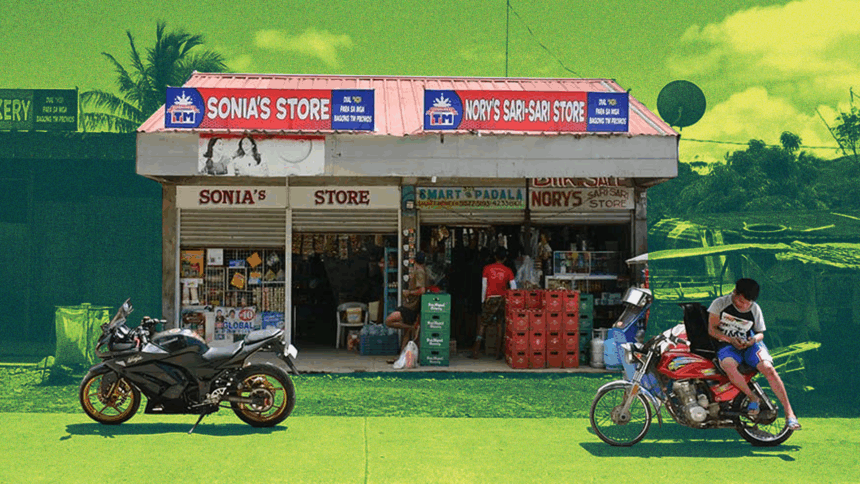Due to the rise of various big stores under companies, sari-sari stores are often overlooked when it comes to economic discussions. However, they play a crucial yet unsung role in driving the Philippine economy.
These small neighborhood shops are more than just convenient places to buy daily essentials, they are lifelines for millions of Filipino households that provide accessible and affordable goods, and empower micro-entrepreneurs.
Roots and Cultural Significance of Sari-Sari Stores
Sari-sari stores originated from the Philippine-Chinese trade system during the Sung dynasty, evolving from mobile vendors to stationary shops.
Their significance was formally recognized in 1959 with the passage of the Republic Act 1180, also known as the Retail Trade Nationalization Act, which ensured that only Filipino citizens could own and operate sari-sari stores.
These stores are deeply embedded in Filipino culture as they are found in every city, town, and village, they reflect the resilience and entrepreneurial spirit of Filipinos.
Sari-sari stores provide affordable, small-quantity goods, making daily necessities accessible even to those with limited financial means. In remote areas, sari-sari stores save time and transport costs by offering convenient alternatives to supermarkets.
Beyond selling goods, they serve as neighborhood gathering places for social interaction and local news.
The role of sari-sari stores in PH economy
Sari-sari stores provide livelihoods for many self-employed individuals and small business owners and serve as an entry point for entrepreneurship, especially for women and families looking for an accessible source of income.
These small stores have an important role in distributing consumer goods, accounting for 70% of manufactured goods transactions in the country.
By sourcing locally, they support Micro, Small, and Medium Enterprises (MSME), create jobs, and ensure access to basic goods in remote areas.
With around 1.3 million stores nationwide, they provide essential goods in small, affordable quantities, catering to the retail mentality of Filipino consumers.
In 2024, the Sari.PH Pro app, a digital platform by tech startup Packworks, reported a 32% increase in sari-sari store transactions, with 175,000 stores actively using the app—marking significant growth from 2023.
“The surge in the number of stores recorded in our app is a testament to the savvy entrepreneurial spirit of these businesses, which are the grassroots foundation of local economies. As they thrive, they create jobs, stimulate the local retail ecosystem and contribute to the overall economic development of the Philippines,” said Packworks CEO and founder Bing Tan.
How modern retail and economic struggles threaten sari-sari stores
Big convenience store chains like 7-Eleven and online shopping sites are making it harder for sari-sari stores to keep customers.
Many store owners struggle to get loans, limiting their ability to expand or sustain their businesses.
Rising prices and reduced consumer spending are forcing more sari-sari stores to shut down. Natural disasters, like the recent Typhoon Aghon in Region IV-B, MIMAROPA Region, can force many sari-sari stores to close. When disasters strike, stores lose customers and supplies become harder to get.
Most sari-sari store owners don’t get social benefits like SSS, PhilHealth, or Pag-IBIG since they are part of the informal economy. Unlike household workers who receive a set salary, many store owners rely only on daily sales to survive.
Rural families depend on sari-sari stores for income, so closures could lead to job losses. Consumers prefer modern retail due to better variety, discounts, and digital payment options.
What sustains sari-sari stores?
The Department of Trade and Industry (DTI) launched the Sari-Sari Store Advancement Program to support over one million sari-sari store owners.
Branded as “Tindahan Mo e-Level Up Mo,” the program equips micro-retailers with digital tools, financial knowledge, and sustainable practices and focuses on digital transformation, financial literacy, sustainability, and consumer protection.
DTI Secretary Fred Pascual emphasized that sari-sari stores serve as economic hubs, making their growth essential for national progress.
Leading companies, including Unilever, Coca-Cola, Universal Robina, Smart Communications, Nestlé, Hapinoy, and GCash, have pledged support for the program.
Consumers, in turn, can contribute to sustaining sari-sari stores by shopping locally and supporting neighborhood stores, ensuring that these micro-enterprises continue to thrive and sustain communities across the country.








